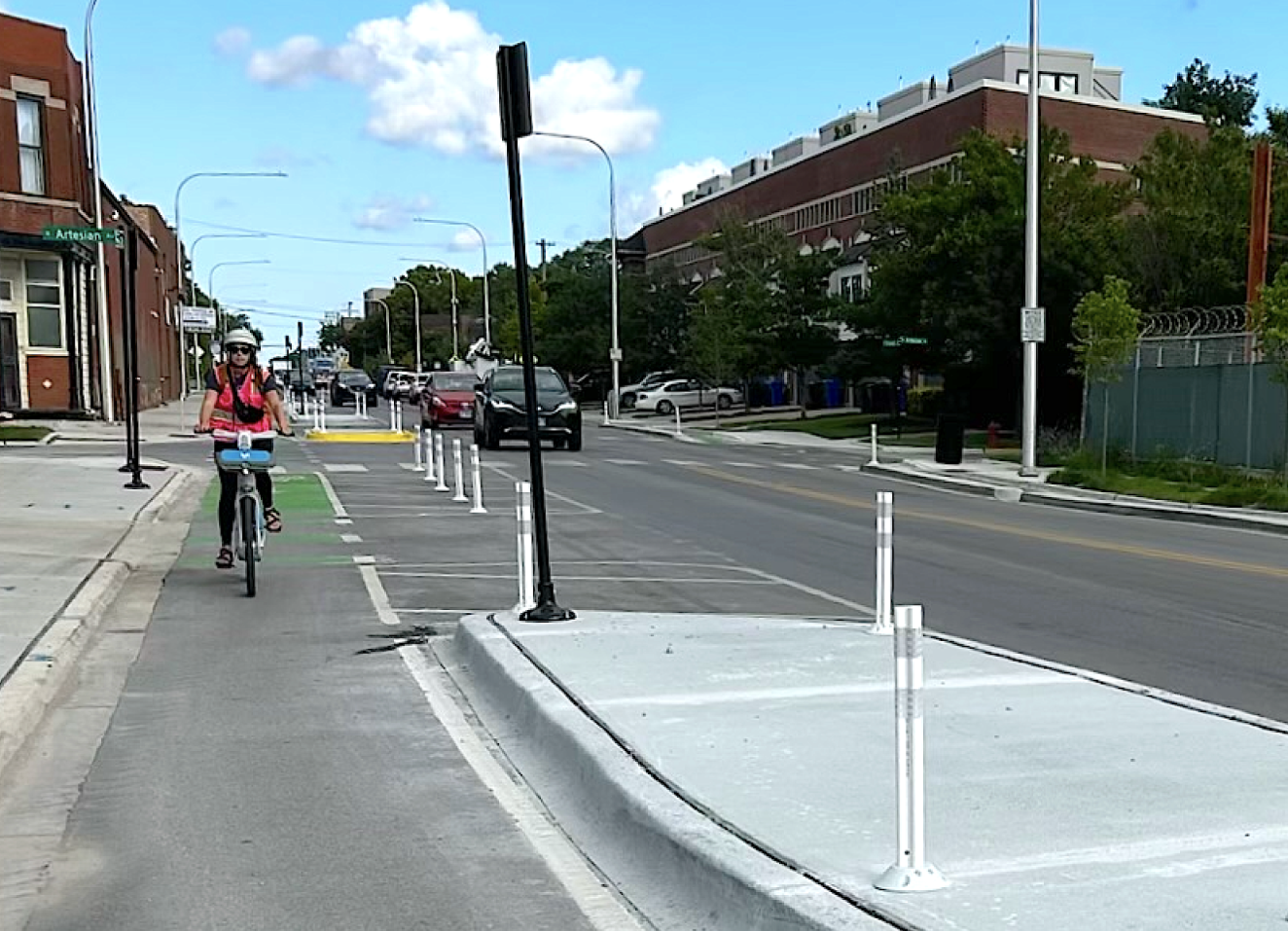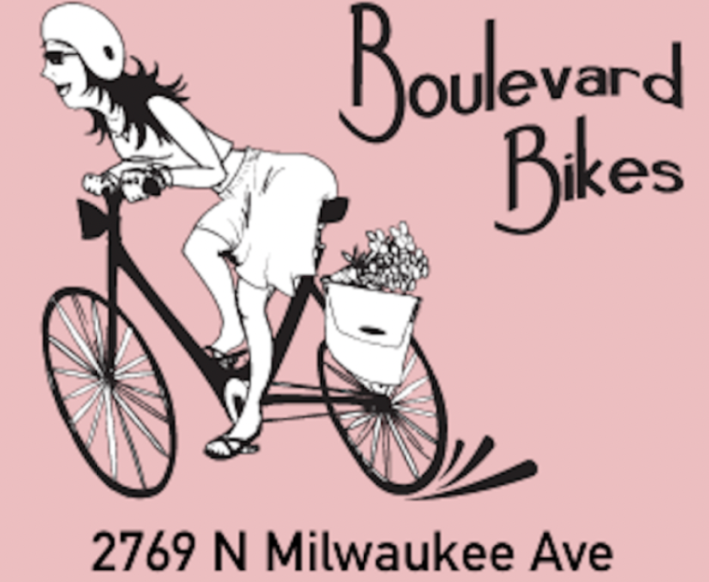
The general reporting on the meeting is by Igor Studenkov, and the commentary on the Grand Avenue project is by John Greenfield.
The October CTA board meeting, held in the shadow of the looming Chicagoland transit fiscal cliff, was a gloomy affair. But in the wake of the surprising October 31 passage of a robust $1.5 billion transit reform/revenue bill in Springfield, aka the "Halloween Miracle," the mood at today's November board meeting was celebratory.
And today the CTA directors approved the agency's draft budget for 2026. But notably, the document doesn’t include funding for planned 24/7 Orange Line trips and other service improvements. That's in large part because the Regional Transportation Authority is only giving the agency enough funding to avert the budgetary rock face, and keeping the rest in reserves for now.
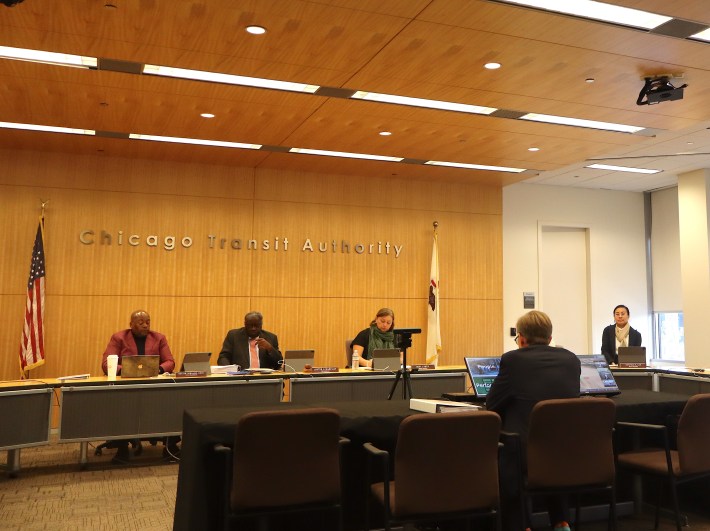
The CTA's draft budget now goes to the RTA for review. The umbrella agency's board is expected to vote on whether to approve CTA, Metra, and Pace budgets in December.
Also at this meeting, Roger Romanelli, the car activist who helped kill the Ashland Avenue bus rapid transit proposal, and West Town residents protested plans for a four-to-three "road diet" with protected bike lanes on Grand Avenue. Their "Not In My Back Yard" argument asserted that this street remix, between Ashland and Ogden Avenues, would impede bus service, although that's almost certainly not the case – more on that in a bit.
What is (and isn’t) in the proposed CTA budget
At the start of the budget season, the RTA instructed the transit agencies to prepare two versions of their budgets. One would be based on a scenario where they got the funding needed to avoid the pecuniary crag, and the other would be modeled on an outcome where they didn't. The CTA went a step further, preparing a "growth" budget that assumed the transit agencies would get $1.5 billion in additional annual funding – which is what happened. The RTA had also ordered the transit systems to raise fares by at least 10 percent whether or not the extra revenue materialized, and the CTA was planning a 25-cent price hike.
But during last Thursday’s upbeat RTA special board meeting, the directors withdrew the fare increase directive and approved the funding marks. Marks basically means how much money each agency will get through taxes the RTA collects.
CTA allocations increased by around $141.9 million. The RTA board voted to keep $319 million as "regional funds" that would "remain within the RTA’s accounts for future distribution to ensure prudent financial management and compliance with [the transit bill] SB 2111."
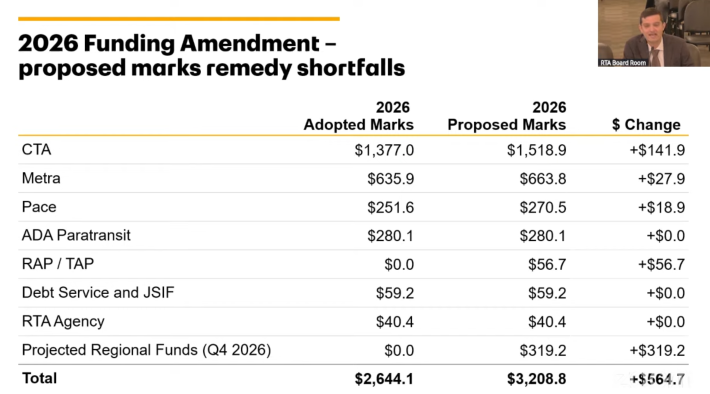
A memo to the RTA board last week stated, "RTA will collaborate with CTA, Metra, and Pace in early 2026 to plan for rider-focused enhancements that can be implemented as the new funding begins to arrive later in the year." The document noted that, because of the inevitable lag between changes to the funding structure kicking in, and the new revenue actually arriving in state and RTA coffers, that cash won’t show up until the third quarter of 2026.
Today, CTA Chief Financial Officer Tom McKone told the board that the proposed 2026 budget before them would be what CTA has been calling the "baseline budget," the version with the economic chasm avoided. It notably includes funding to rehab more of the Blue Line's slow-zone plagued Forest Park Branch. The section as far west as the Illinois Medical District stop recently got new tracks and station upgrades. This next phase will continue the rehab process through the West Side and suburban Oak Park and Forest Park.
Other notable items in the proposed CTA budget include a pilot to increase rail car cleaning frequencies. The budget would also expand the "Refresh & Renew" program that has spruced up stations.
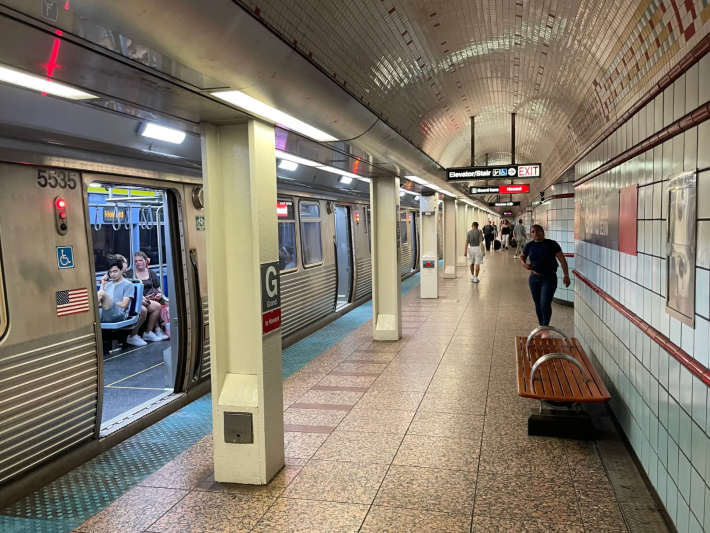
In addition the budget includes money to launch an Equitable Transit-Orientated Development office. And the document would increase the funding the CTA gives to the Chicago Police Department for regular patrols and off-duty officers providing security, as well as piloting the CTA's first-ever Transit Ambasador program.
But McKone, as well as Acting President Nora Leerhsen, emphasized that any service expansions won’t be implemented – at least for now. That includes the much-anticipated Orange crush of round-the-clock service to and from Midway. But, "We will be working with RTA to get [the budget] amended as quickly as possible," McKone assured the board.
Director Roberto Requejo said that he wants the RTA to release more funding ASAP. He said he's worried that, without the additional dough, rider priorities like public safety and cleanliness won't get fully addressed. He pressed McKone on what the timeline would be.

If you appreciate article like this and want SBC to keep publishing them in 2026, please consider making a tax-deductible donation here. Thanks!
The CFO responded that, while the new greenbacks won’t arrive until the second half of next year, the CTA still needs to lay the groundwork for any service expansion and other improvements. That requires getting a sense of what the agency can and can’t afford. "We've been communicating with RTA about the [need] to amend as soon as possible," he added.
Board member Rosa Ortiz also said she supports pushing RTA to "make sure we get the allocations that we need, because of the things that we advocated for."
Board Chair Lester Barclay said that, while he's glad the transit bill came through, he's worried that the $1.5 billion figure might have given the public a false sense "that we get a lot of money to do a lot of things that are in the" Growth Plan. He asked for regular monthly updates "as to where we are in the process toward RTA making the determination on what we have coming."
"I would be happy to provide that update," responded McKone.
Using bus lanes as a excuse to not build protected bike lanes
If you've followed local transit issues as long as SBC has, you may recall that in the early 2010s, Fulton Market Association executive director Roger Romanelli led the NIMBY opposition to the Ashland Avenue BRT proposal. The CTA and the Chicago Department of Transportation floated the idea of converting the inside travel lanes of Ashland to bus-only lanes. Romanelli and some other motorists and merchants were dead-set against having fewer lanes to drive in, plus left-turn prohibitions at some intersections. They ultimately succeeding in convincing then-mayor Rahm Emanuel to shelve the idea.
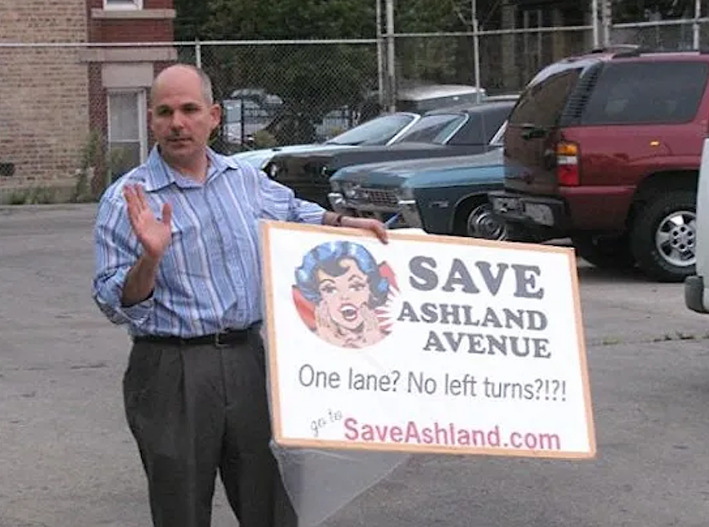
Since then, Romanelli has pitched a number of dubious transportation-related ideas, that usually have something to do with coddling motorists. For example, in 2021 he lobbied for spending billions in federal infrastructure money to rebuild the Lake Street 'L' tracks to make them easier to drive under.
During today's CTA meeting public comment period Romanelli and some confederates rolled out his latest crusade: trying to stop CDOT from extending existing protected bike lanes on Grand Avenue further east into West Town. In July 2024, CDOT cut the ribbon on the first phase of the bikeway project, a 1.2-mile stretch of PBLs on Grand between Chicago and Damen avenues. Since then, the half mile of Grand between Damen and Ashland has gotten protected lanes.
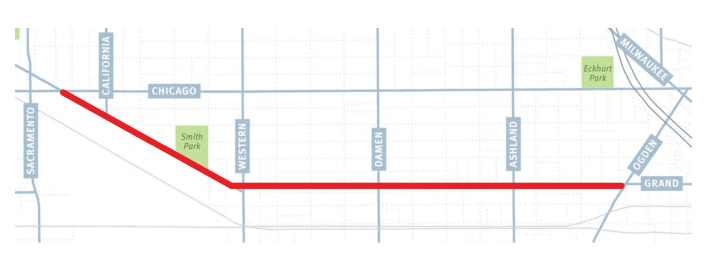
The department is currently getting ready to extend the Complete Streets makeover from Ashland to Ogden, a little under a half mile. The plan for the new section includes the road diet with concrete-protected bike lanes, plus amenities for pedestrians and transit riders.
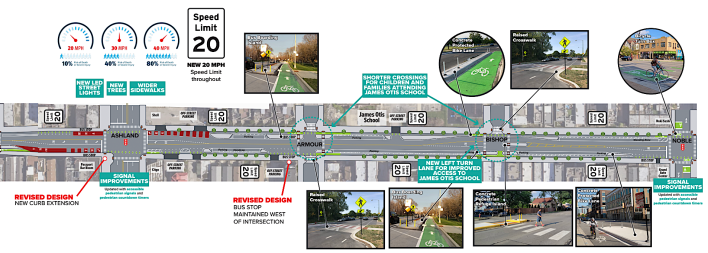
At today's hearing Romanelli and his allies tried to sell their idea for painted bus lanes on Grand as something to improve transit. "We have the space," he told the board. "We have the room for dedicated CTA bus lanes shared with bicycles."
As an example of his proposed layout, he pointed to the existing painted bus lanes on Chicago Avenue in this part of town, a mere 0.3 miles north of Grand. Those lanes are obviously not a great place to ride bikes, since they lack physical protection on a busy street. Moreover, bicycle riders and bus drivers making stops are forced to "leapfrog" each other, which is not particularly safe or pleasant for anyone involved.
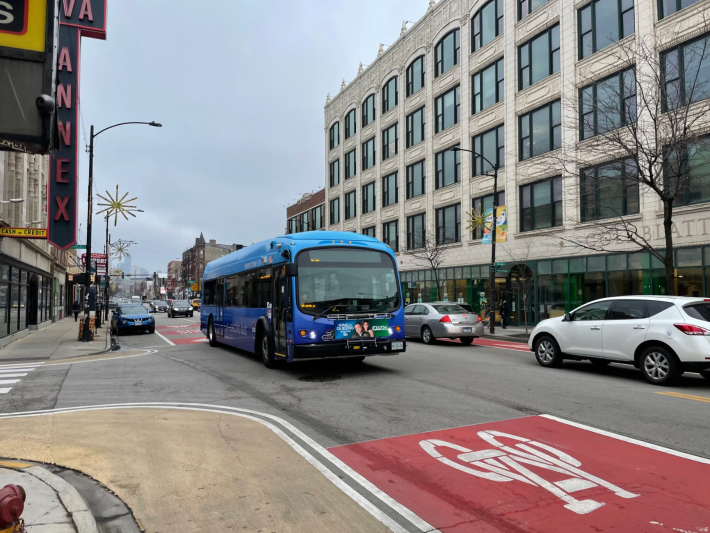
But there were indications that the PBL opponents' main concern here is not improving transit. Rather, it appears they're mostly worried about CDOT making car driving somewhat less convenient by converting a mixed-traffic lane and reconfiguring parking.

Local resident Nikki Baldwin Rivera said she is particularly concerned about the street remix impacting Alliance Bakery's location at 1837 W. Grand Ave. She said she is concerned about the parking lane in front of the pastry shop being relocated to the north of the future eastbound curbside bike lane.
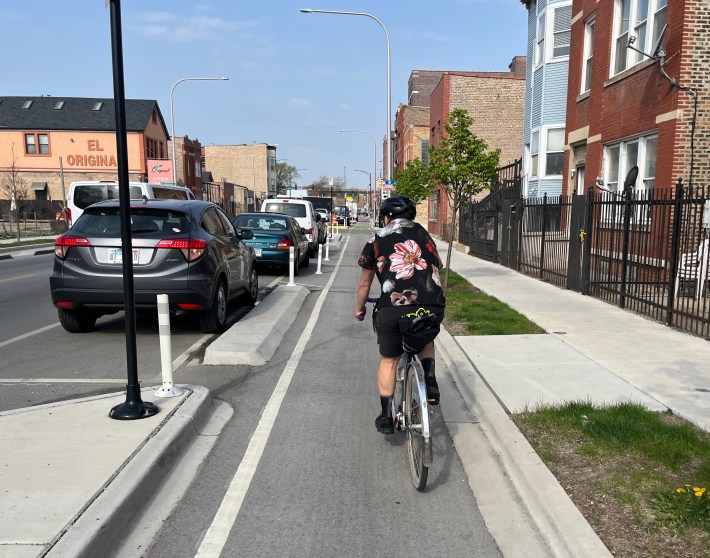
"As a consumer at Alliance and someone close to being senior myself, I... need to park close to the curb," she said. "The lack of parking lanes would hurt Alliance’s employees, and customers who need faster, not slower buses."
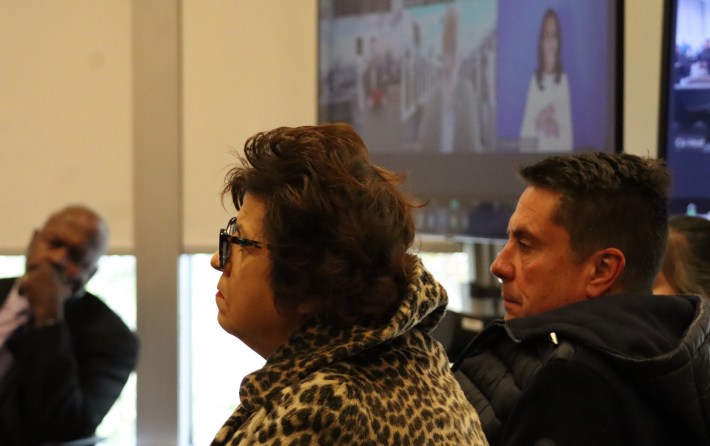
There are a few issues with these arguments. Chicago drivers are generally more comfortable with mixed-traffic lanes being marked as bus-only than converted to protected bike lanes. Since bus lanes are only sporadically enforced in our city, motorists know they can usually get away with parking and driving in them. (The City is currently testing parking enforcement cameras mounted on buses, but a new state law would be needed to allow cam enforcement of illegal driving in bus or bike lanes.)
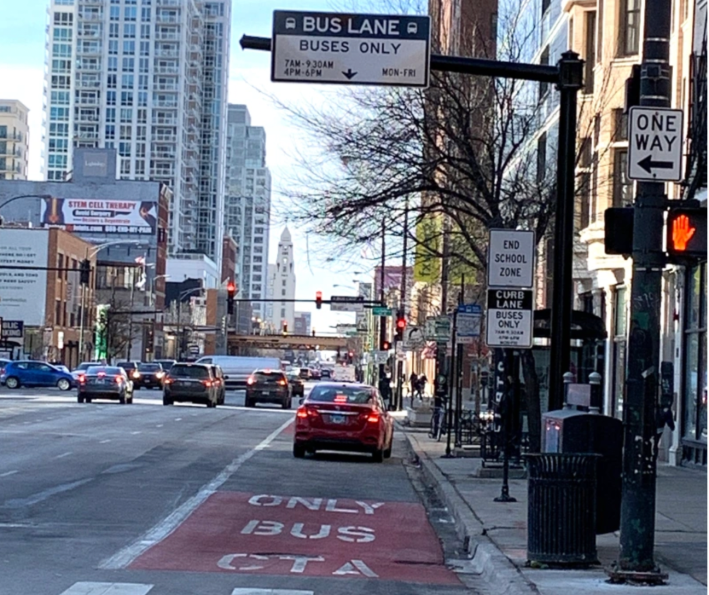
As for the notion protected lanes are bad for seniors (or people with disabilities, or families with small kids), in reality they calm motorized traffic and shorten pedestrian crossing distances, and make it safer and easier to cross streets. And the Grand plan already includes some short stretches of bus lanes, as well as bus boarding islands, which allow the operator to pick up passengers without having to pull to the curb, which means faster buses!
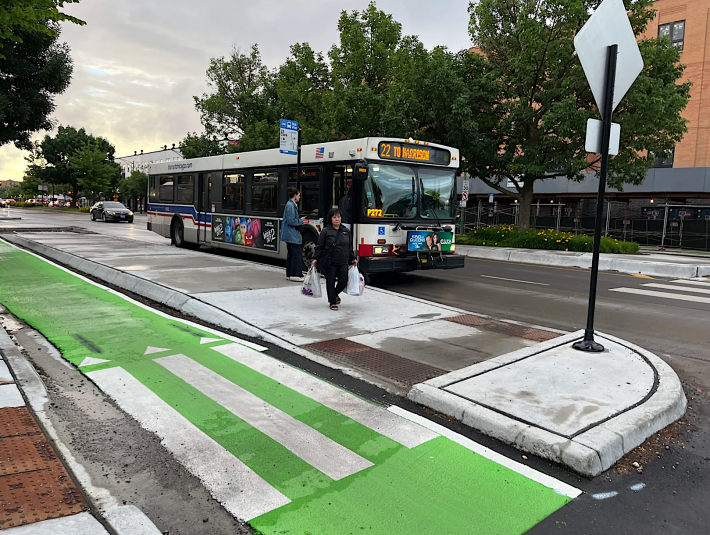
But it's unlikely that the CTA or CDOT will be interested in caving to Romanelli and his posse, since the Grand plan has already been vetted in other, well-attended community meetings.
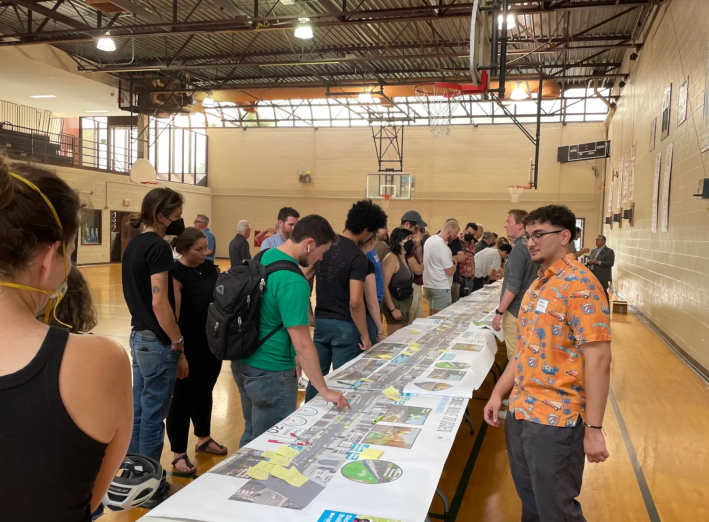
Thoughts on the transit reform bill
Today's meeting was the first CTA board hearing since the transit bill passed. In her President’s Report at the tail end of the meeting, Leerhsen described its passage as a blessing after the "heavy" five years marked by the COVID-19 pandemic, lower ridership, and the ensuing funding uncertainty.
Leerhsen compared the relief of writing a letter to CTA employees after the bill’s passage, telling them they wouldn't be getting the feared pink slips, to the grim letters she drafted a few years earlier. "Some of [the letters] really stick with you, and when I drafted that one [last October 31], I thought of 16 [letters] we sent during COVID to inform people about 16 [employees] who died," she said.
Quoting the poem "Don't Hesitate" by Mary Oliver, Leerhsen said that "joy is not meant to be crumb." That is, when life provides moments of happiness, our response should be unrestrained.
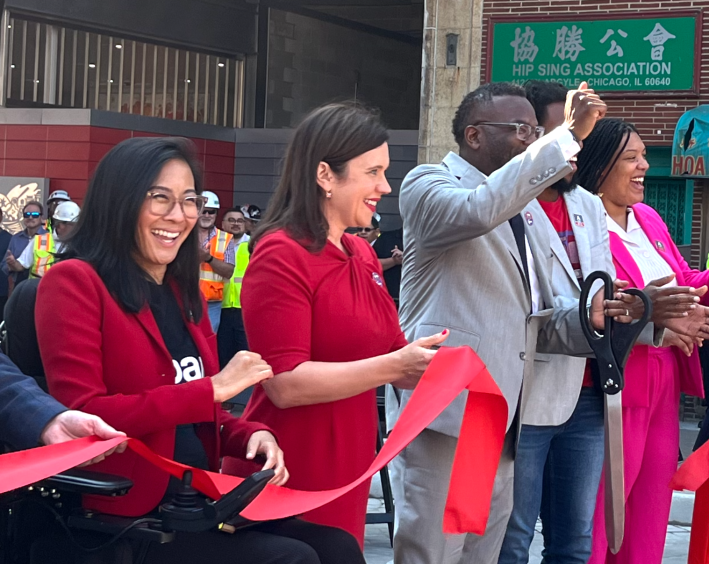
"It's over," Leerhsen said. "And we will celebrate that, and will live that, and we will celebrate in it in the happy joys way into the future."
Barclay said he is "pleased to have certainty" now that the funding arrived, and appreciated that it "finally replaces the outdated [funding] model with the framework that reflects more equitably the service we provide."
However, Barclay added that he has singificant reservations about the changes in the transit governing structure, with the relatively toothless RTA being replaced by the more powerful Northern Illinois Transit Authority. He said he's worried that "it will limit our ability as an agency to react quickly and be responsible to the needs of our community."
Board member Michelle Lee asked for a round of applause for all CTA staffers who helped make the reform bill happen. "This is something to reflect upon, something to rejoice and savor," she said.
Requejo said that he's looking forward to a new era of inter-agency collaboration. "Instead of asking 'What’s my slice of the pie?' we ask, 'How do we make a better pie together.'"

On November 12, SBC launched our 2026 fund drive to raise $50K through ad sales and donations. That will complete next year's budget, at a time when it's tough to find grant money. Big thanks to all the readers who have chipped in so far to help keep this site rolling all next year! Currently, we're at $295, with $49,705 to go, ideally within three months.
If you value our livable streets reporting and advocacy, please consider making a tax-exempt end-of-year gift here. If you can afford a contribution of $100 or more, you can consider it a subscription. That will help keep the site paywall-free for people on tighter budgets, as well as decision-makers. Thanks for your support!
– John Greenfield, editor
